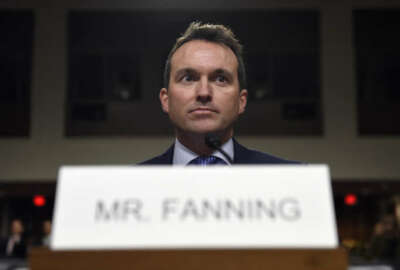 Exclusive
Exclusive Exclusive
Are some of the Army’s best soldiers being forced out?
Officers with advanced civilian degrees are getting pushed out of the Army. But they are the very people Defense Secretary Ash Carter wants in the military. The...
A Rhodes Scholar.
The co-founder of a successful professional development organization.
A special forces operator who speaks three languages.
A three-time champion on the game show “Jeopardy!”
These are four Army officers — three captains and one lieutenant — that any business would hire in the blink of an eye.
But these talented, highly educated leaders are on the cusp of being involuntarily separated, have already been released or have had their jobs saved in the nick of time by Gen. Mark Milley, the Army chief of staff.
Special Report Overview
The Army is in a talent crisis. Its most recent study on the issue, in 2010, found only 6 percent of Army officers thought the service did a good job of retaining its best leaders.
The Army fights to keep private industry from leeching its best soldiers. With better pay, more comprehensive benefits and a stable location, the private sector seems tempting compared to military life.
But former Army officials and experts who spoke to Federal News Radio as part of our special report: The Army is Shortchanging its Future Force say the service is forcing out some of its best leaders even without the appeal of a private sector job luring them away.
Meet Capt. Jim Perkins, one of those soldiers being forced out.
Perkins loves the Army. In fact, he loves it so much that he started Military Mentors, an organization founded to improve the quality of leadership in the military.
The organization connects members with each other and gives them tools to develop themselves as leaders.
Perkins is also the executive director of the Defense Entrepreneurs Forum, an innovation engine of emerging defense leaders that wants to solve national security problems from the bottom up by using civilian and business techniques.
He and his wife, an Army pediatrician, just had their first child this summer.
Perkins did all this while getting his M.B.A. at Georgetown University, serving as president of the Georgetown Student Veterans Association and as executive vice president of the McDonough Military Association.
The Army paid for him to get that degree, and now Perkins said the Army is about to release him from duty with severance pay.
Perkins is the perfect example of the Army’s personnel system letting accomplished soldiers with unconventional career paths fall by the wayside, the same type of soldiers Defense Secretary Ash Carter wants to keep the Defense Department technologically superior to rival nations. But the policies are hitting resistance.
The current system is “100 percent going against what Ash Carter is looking for. … The Force of the Future, [more educated, innovative soldiers] is what it’s all about, but there are plenty of people, in the Beltway, specifically in the Pentagon who are fighting this tooth and nail,” Perkins said.
Perkins isn’t the only highly talented soldier getting the boot.
Lt. Joseph Riley, the top nationally ranked ROTC cadet in 2013 and a Rhodes Scholar, learned he also might be forced out of that Army. That’s because he studied at Oxford University for two years instead of doing more status-quo, military-sanctioned jobs like his peers and therefore was not being promoted.
Riley’s job wasn’t saved until he caught the attention of Army Chief of Staff Gen. Mark Milley while they were both speaking on a panel.
Others aren’t as lucky.
Capt. Frank Allo, whose name has been changed to protect his professional career, deployed to South America and Afghanistan in the Special Forces.
In addition to speaking multiple languages, Allo earned a spot in Georgetown University’s top ranked School of Foreign Service, but deferred that schooling to ensure he could keep up with his peers in required duties and be promoted to major.
But when the Army told him he wouldn’t be promoted, he decided to give up on active duty. He’s now about to begin an M.B.A. program at Duke University, Durham, North Carolina.
Perkins, experts and some in the Army think the mechanisms that push out some of the Army’s best talent are directly tied to the Army’s personnel evaluation system.
“We use an industrial, archaic system to manage personnel in the 21st century,” Perkins said. “With our evaluation systems, the metrics that we end up using to evaluate a person are just really poor.”
That system is causing a disconnect between the soldiers whom the senior leadership wants and the ones that are being passed over for promotion.
As the Army continues the drawdown of its total force from 1.3 million to 980,000, experts fear the service will push out the wrong people at an even faster rate. Retired Army Lt. Gen. David Barno and Nora Bensahel, a senior fellow at the Atlantic Council, warned in a September report that the Army must “reduce excessive deference to rank and position, reject Army anti-intellectualism and strengthen ethics and integrity.”
One of the ways the Army can reduce its ranks is by tightening the number of officers who are promoted to the next rank. It does so through promotion boards.
“What we expect a promotion board to do is to select those officers who have demonstrated the potential to serve at the highest levels or at higher levels … the boards help us because they differentiate talent,” Maj. Gen. Wilson Shoffner, director of the Army Talent Management Task Force told Federal News Radio. The boards “are looking for a combination of several different attributes. We are looking to promote leaders of character, who have the right experiences, the right operational experience, who have demonstrated commitment to the profession and also have demonstrated competence in their profession.”
Up or out and promotion boards
In 1980, the Defense Officer Personnel Management Act went into effect. It standardized the military’s “up or out” system in which officers must progress to the next rank according to predetermined timetables, or face separation from the military.
“Promotion boards meet for everyone from lieutenant all the way up to a two star general,” Bensahel said. “They have criteria they are looking for and that effects who they select.”
| Promote to: | Time in Service | Minimum Time in Grade Required by Law | Promotion Opportunity |
| 0-2 | 18 months | 18 months | Fully qualified (nearly 100 percent) |
| 0-3 | 4 years | 2 years | Fully qualified (nearly 100 percent) |
| 0-4 | 10 years | 3 years | Best qualified (80 percent) |
| 0-5 | 16 years | 3 years | Best qualified (80 percent) |
| 0-6 | 22 years | 3 years | Best qualified (50 percent) |
When promotion boards meet, they are required to assess all officers in a class. Officers are given a certain number of years they can stay in a rank. Everyone in the same year at the same rank is evaluated by one board.
The Army will decide what percentage of a rank it wants to keep. For instance, it might want to keep 90 percent of its lieutenants. The lieutenants with the top 90 percent of scores will be promoted and the bottom 10 percent will be passed over.
Everyone is given two opportunities to be promoted. If the board passes over an officer twice, he or she is generally forced to leave the military.
The system is meant to bring officers up to the best of their abilities. The very best will be promoted to general, and the rest take the exit ramp at the rank the promotion board deems their full potential.
Steve Smith, a retired Army major general and founder of SW Smith & Associates Consulting, sat on numerous Army Reserve promotion boards during his time in the Army.
Smith said officers who are eligible for a promotion board review are notified 6-to-12 months ahead of time. Officers must use that time to make sure evaluations from superiors are up-to-date and to collect any pertinent information for their file.
“The boards are generally chaired — at least the boards I’ve been on — by a general officer. Then they get a mixed demographic across the Army of expertise, branches of the Army, male/female, race, color, creed, all of that. They try to get the board to be as diverse as possible,” Smith said.
The board, in most cases, is made up of an odd number of people and members are not allowed to discuss candidates, they can only evaluate an officer based on what they see in the file, Smith said.
When a board evaluates an officer, the first thing to come up is their photograph.
The picture is “in the Class A uniform, you know the one with all the ribbons and stuff, it gives you a feel for whether the officer has attention to detail, physical shape, based on the ribbons you can almost tell where they’ve been in terms of deployment,” Smith said.
The board members review the candidates through an online system so the officer’s entire record, including any derogatory information, such as disciplinary action or criminal record, and evaluation reports, all come up in a matter of clicks.
“What I can do on an officer evaluation report (OER), I can see at what level an officer is working at … you can scan his general information that talks about integrity, all the Army values, you passed your physical fitness test, you’re within the height and weight standards,” Smith said. “Then you go to the back of the document where the comments are and read what his boss and his boss’ boss say about this particular soldier.”
Another thing boards must take into account is the career path of an officer. There is a certain path they are expected to follow, certain jobs the candidate should take and at some levels of education they should finish, Smith said.
Officers also may submit a letter explaining gaps or anomalies in their service.
The letters “are a lot of times answering questions that I think might come up in my file and so [the board] is not trying to figure it out,” Smith said. That includes missing normal assignments while working special assignments like advising allies on building a military academy.
From there each member rates the officer from one to six, six being the highest.
Who the Army really wants
The way those numbers are chosen is half through instruction and half through opinion.
The Secretary of the Army issues guidance to promotion boards about what the service is searching for in each rank. The guidance is in addition to key and developmental requirements officers are required to fulfill to progress to the next rank.
Federal News Radio obtained the secretary’s guidance for the 2016 promotion boards for the rank of lieutenant colonel.
The guidance, signed by former Army Secretary John McHugh, asked board members to look for some obvious traits in officers.
It asked for leaders with an “unshakable commitment to Army culture and values” and those who “display the ability to build teams of subordinates, collaborate with peers and understand how they contribute and are nested in the larger mission.”
While those traits are more universal, the guidance also instructed board members on issues more pertinent to the Army’s future strategic goals.
“We need leaders who are committed and willing to examine and develop new solutions for an evolving and dangerous world,” the memo stated.
It asked board members to identify officers who can innovate and conceptualize.
The document also told board members to give particular attention to advanced education that meet the Army’s needs, for example graduate degrees and law degrees.
The secretary asked the board to take certain assignments into account, including cyber experiences and unique development positions such as transition teams.
McHugh’s guidelines are in line with Carter’s Force of the Future concept.
“We need people who’ve had those kinds of diverse experiences; they help keep us innovative and open to new ideas that can make us better. A Ph.D., a masters, or another experience or form of advanced training doesn’t make for a diverted warrior — it makes for a smarter warrior,” Carter said this summer.
More recently, Milley described what he thought the future soldier should look like.
“Our leaders then are going to have to be self-starters. They are going to have to have maximum amounts of initiative. They are going to have to have critical thinking skills well beyond what we normally think of today in our operations. They are going to have to have huge amounts of character so that they make the right moral and ethical choices with the absence of supervision under the intense pressure of combat. They are going to have to have a level of mental and organizational agility that is not necessarily current in any army really,” Milley said during a press conference earlier this month.
He added leaders will need higher endurance, and senior leaders will need to trust lower-level executives more because they will not be able to communicate with them in a degraded environment.
Milley said the Army must move toward an approach to talent management and development that is different than any other country in the world.
Soldiers with those qualities will be prepared to take on China, Russia or any other technologically equal rival, he said.
The Atlantic Council’s Bensahel said there is little doubt from the military services that this is the right approach to manage DoD’s up-in-coming leaders, but at least in the Army, the prioritization of those attributes has not filtered down to the lower levels.
“The need for broadening assignments, to have those sets of diverse experiences and so on that all of the service chiefs, certainly Gen. Milley in the Army, have said are a priority, but that message doesn’t always go down to the promotion boards,” Bensahel said.
And that is where the disconnect between policy and practice begins.
Read part two of Federal News Radio’s special report: The Army is Shortchanging its Future Force.
Copyright © 2025 Federal News Network. All rights reserved. This website is not intended for users located within the European Economic Area.
Scott Maucione is a defense reporter for Federal News Network and reports on human capital, workforce and the Defense Department at-large.
Follow @smaucioneWFED







